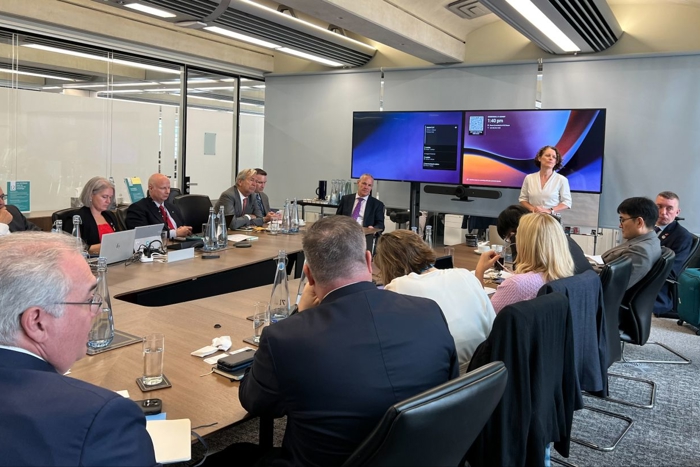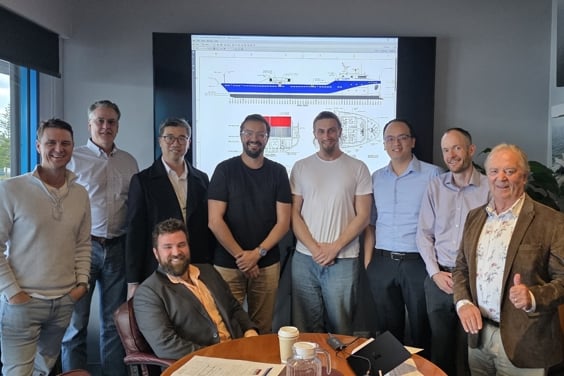Nuclear power represents a pivotal innovation in ship propulsion technology, using onboard nuclear reactors to provide efficient and sustainable energy solutions. This method of propulsion can significantly extend the operational range of vessels, reduce reliance on traditional fossil fuels, and minimise the frequency of refuelling.
However, despite its advantages, integrating nuclear power into the maritime industry poses significant safety, regulatory, and public perception challenges. Furthermore, the complex regulatory landscape governing nuclear operations complicates the approval and implementation processes for vessels, highlighting the need for comprehensive international standards and collaboration among nations.
To address these issues, the International Atomic Energy Agency (IAEA) will launch its Atomic Technologies Licensed for Applications at Sea (ATLAS) project later this year. This initiative aims to establish a framework for the safe and secure deployment of civil nuclear applications at sea. The IAEA, in co-operation with the IMO, will oversee and guide this global effort, using its established standards for nuclear safety, security, and safeguards.
Setting the course
The ATLAS project was born from a significant meeting in May last year between the IAEA Director General Rafael Mariano Grossi and senior executives of LR. Mark Tipping, LR’s Global Power to X Director and a key figure in these discussions, recalls that the concept quickly gained traction “Within hours of the initial meeting, the IAEA had developed the initial concept for ATLAS, marking the beginning of a major new initiative to redefine maritime energy,” he said.
Grossi unveiled the project during an initial fact-finding workshop in London last August, hosted by LR, which brought together nuclear and maritime regulators, including the IMO, operators of nuclear assets, insurers, and ports to address the challenges and opportunities of deploying nuclear technology in the maritime environment. This collaborative approach ensures ATLAS benefits from both nuclear and maritime regulatory expertise. Grossi says: “Given its mandate and global membership, I believe the IAEA is the most appropriate organisation, in partnership with the IMO, to coordinate, facilitate and guide this global initiative.”


"The maritime industry's current regulatory framework for nuclear applications is fragmented and not fit for purpose," explains Tipping, " For instance, SOLAS Chapter 8, which governs nuclear propulsion, lacks the provisions necessary to accommodate modern reactor designs and safety protocols. ATLAS aims to bridge this gap by creating a new structure that addresses modern needs while ensuring the highest standards of safety and security."
With widespread interest and support anticipated from the IAEA’s Member States, the initiative's scope is ambitious. It aims to achieve several key objectives, including the development of an international licensing model for reactors in the maritime environment. Nuclear regulators, who lack experience in maritime matters, will work with LR and other classification societies to develop and establish rules and standards to supporting nuclear deployment within maritime settings. Furthermore, ATLAS will address essential aspects such as training, legal requirements, and insurance for managing nuclear assets.
The project is targeting multiple maritime applications including ports, harbours, and offshore industries. By addressing regulatory gaps, enhancing public engagement, and leveraging technological advancements, ATLAS aims to create a sustainable, efficient, and resilient energy future for the industry.
Building public trust and acceptance
Public perception remains a significant hurdle for nuclear adoption. Tipping emphasises the importance of transparent communication to build societal trust. “We need open dialogue about nuclear technologies—their risks, advantages, and environmental impacts,” he said. “This isn’t about convincing the public that nuclear is safe; it’s about demonstrating it through evidence and engagement.”
This transparent approach aims to address public concerns while highlighting the benefits nuclear power can bring. Nuclear-powered vessels offer the potential for zero-emission operations, contributing significantly to the maritime industry's decarbonisation goals. Nuclear power offers advantages such as a dense energy source that is significantly more energy-dense than fuel oil, reducing the need to carry large amounts of fuel. Nuclear-powered ships can operate for years without refueling, offering operational benefits and reducing the risk of fuel availability issues. Additionally, nuclear power allows ships to potentially go faster and spend long periods deployed away from ports.
The road ahead
While the vision for ATLAS is ambitious, its implementation will be gradual. First-mover projects are anticipated in the early 2030s, operating under special regulatory measures. By 2035, a fully developed regulatory framework is expected to enable broader adoption of nuclear technologies. This phased approach reflects the complexity of integrating nuclear power into an industry governed by diverse international standards.
With its extensive experience in nuclear projects, LR will play a key role in these efforts. “LR’s role in classification development and regulatory alignment will be instrumental in the ATLAS project. This expertise positions us well to support the project's development and implementation over the coming months and years,” Tipping added.
As the maritime industry faces increasing pressure to reduce its environmental impact while maintaining operational efficiency, ATLAS represents a significant step forward. By creating a comprehensive framework for the safe deployment of nuclear technology at sea, the initiative could help unlock a new era of sustainable maritime operations.

Message from the International Atomic Energy Agency (IAEA)
“The IAEA’s mandate is to promote the peaceful use of nuclear energy and I see a growing momentum for states now seriously considering the peaceful uses of nuclear technology for a range of maritime applications. The IAEA has the mandate, as well as the technical, regulatory and legal experience and the global reach to facilitate ATLAS, through our safety standards and security guidance, our essential safeguards role, and our legal and peer review support, for example. However, I also believe collaboration will be necessary with organisations such as the International Maritime Organisation, to enable ATLAS to succeed with the pace that both our climate and economic ambitions demand.” – IAEA Director General Rafael Mariano Grossi.
Allseas supports ATLAS
As a deliverer of pioneering offshore projects, Allseas has set a firm intention to build a nuclear-powered asset by 2030 to join its fleet of specialised and technologically advanced vessels. Stephanie Heerema, Project Manager Nuclear Developments, at Allseas told Horizons, “ATLAS will play a pivotal role in shaping the regulatory landscape that is urgently needed to enable nuclear power offshore, speeding up the transition to a more sustainable maritime industry.”

Featuring insights from Mark Tipping, Power to X Director at LR, and Jez Sims, Nuclear & Submarine Technology Specialist at LR.










